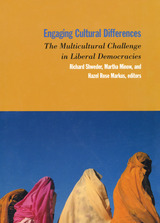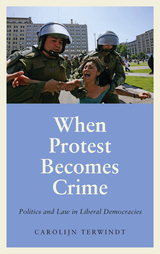2 books about Liberal Democracies

Engaging Cultural Differences
The Multicultural Challenge in Liberal Democracies
Richard A., Shweder
Russell Sage Foundation, 2002
Liberal democracies are based on principles of inclusion and tolerance. But how does the principle of tolerance work in practice in countries such as Germany, France, India, South Africa, and the United States, where an increasingly wide range of cultural groups holds often contradictory beliefs about appropriate social and family life practices? As these democracies expand to include peoples of vastly different cultural backgrounds, the limits of tolerance are being tested as never before. Engaging Cultural Differences explores how liberal democracies respond socially and legally to differences in the cultural and religious practices of their minority groups. Building on such examples, the contributors examine the role of tolerance in practical encounters between state officials and immigrants, and between members of longstanding majority groups and increasing numbers of minority groups. The volume also considers the theoretical implications of expanding the realm of tolerance. Some contributors are reluctant to broaden the scope of tolerance, while others insist that the notion of "tolerance" is itself potentially confining and demeaning and that modern nations should aspire to celebrate cultural differences. Coming to terms with ethnic diversity and cultural differences has become a major public policy concern in contemporary liberal democracies, as they struggle to adjust to burgeoning immigrant populations. Engaging Cultural Differences provides a compelling examination of the challenges of multiculturalism and reveals a deep understanding of the challenges democracies face as they seek to accommodate their citizens' diverse beliefs and practices.
[more]

When Protest Becomes Crime
Politics and Law in Liberal Democracies
Carolijn Terwindt
Pluto Press, 2019
How does protest become criminalised? Applying an anthropological perspective to political and legal conflicts, Carolijn Terwindt urges us to critically question the underlying interests and logic of prosecuting protesters. The book draws upon ethnographic research in Chile, Spain, and the United States to trace prosecutorial narratives in three protracted contentious episodes in liberal democracies. Terwindt examines the conflict between Chilean landowners and the indigenous Mapuche people, the Spanish state and the Basque independence movement, and the United States' criminalisation of 'eco-terrorists.' Exploring how patterns and mechanisms of prosecutorial narrative emerge through distinct political, social and democratic contexts, Terwindt shines a light on how prosecutorial narratives in each episode changed significantly over time. Challenging the law and justice system and warning against relying on criminal law to deal with socio-political conflicts, Terwindt's observations have implications for a wide range of actors and constituencies, including social movement activists, scholars, and prosecutors.
[more]
READERS
Browse our collection.
PUBLISHERS
See BiblioVault's publisher services.
STUDENT SERVICES
Files for college accessibility offices.
UChicago Accessibility Resources
home | accessibility | search | about | contact us
BiblioVault ® 2001 - 2024
The University of Chicago Press









